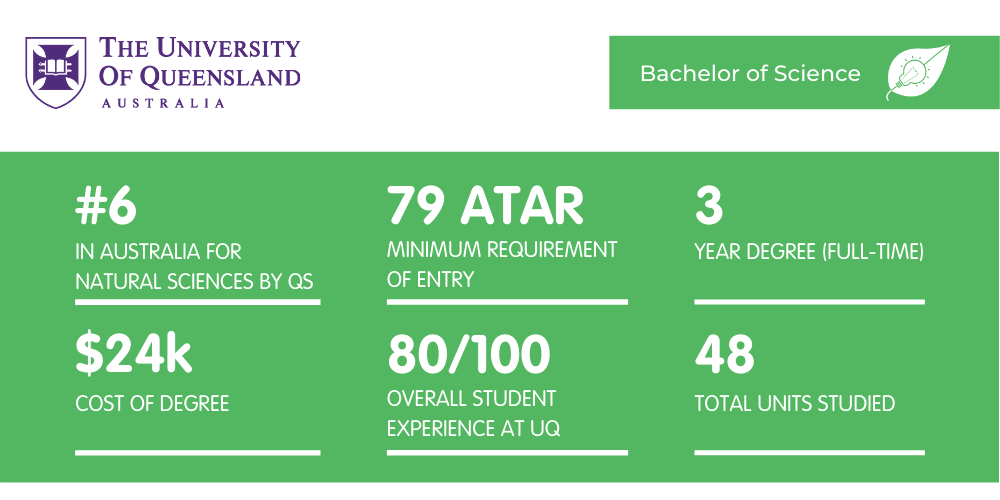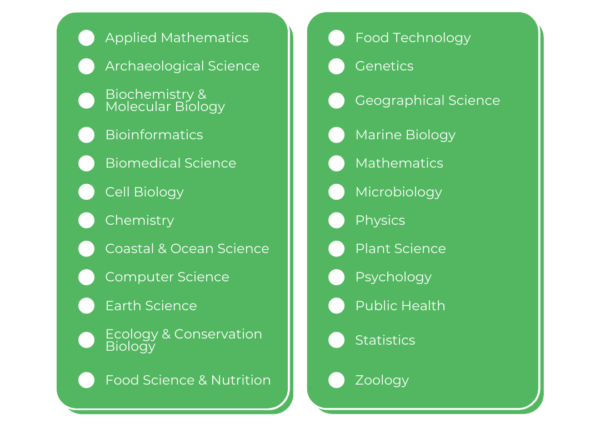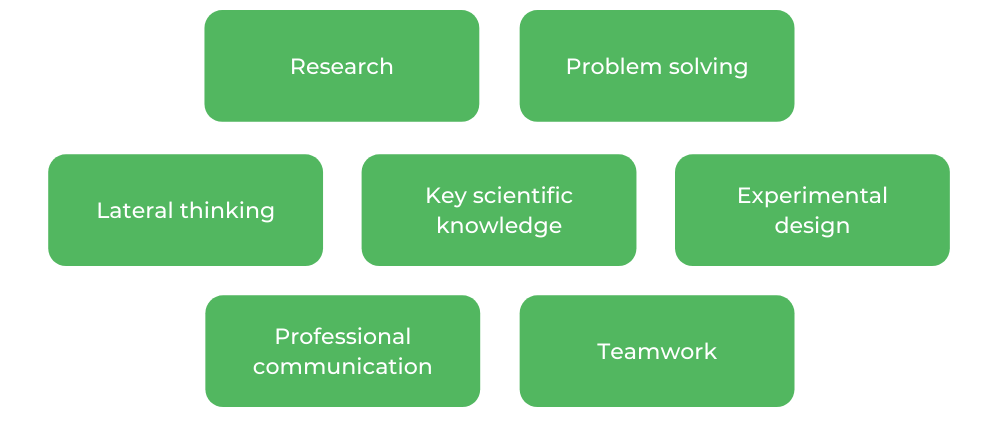Does science, research, learning new things, experiments, good friendships, clubs (woah, that was a mouthful), really get you going? Then perhaps your ideal degree is a Bachelor of Science at UQ!
If you’d love to challenge yourself and find a scientific major, the Bachelor of Science at UQ may be the course for you.
Let’s dive in and find out more!
What is a Bachelor of Science at UQ?
Core Units and Majors
How to Get into a Bachelor of Science at UQ
What’s the Teaching Format?
What’s the Faculty and Culture Like?
What is a Bachelor of Science at UQ?
A Bachelor of Science at UQ will develop your scientific knowledge and key research skills. You will study a range of broad science subjects, before jumping into detailed majors that provide you with practical and research opportunities.
You’ll be studying in the heart of Brisbane, giving you great connections to local businesses and researchers!
As a student, you’ll also get to work in various labs, receiving a highly practical education. This is different to UQ’s Bachelor of Advanced Science, which is far more research based.
This degree has actually just been reframed, giving students more flexibility than ever! Now, students can study two majors and a minor, which previous years didn’t have the option of undertaking.
Ultimately, you’ll graduate as part of an intelligent cohort, equipped with ambition, scientific expertise and great critical thinking skills.
Double Degrees and Honours
Unlike its Advanced Science counterpart, this degree offers a lot of flexibility when considering degree study options! In fact, UQ offers 14 dual degrees to complement your scientific study.
You could pair a science degree with:
- Bachelor of Economics
- Bachelor of Engineering (Honours)
- Bachelor of Commerce
- Bachelor of Information Technology
- Bachelor of Music (Honours)
- Bachelor of Computer Science
- Bachelor of Laws (Honours)
- Bachelor of Arts
- Bachelor of Journalism
- Bachelor of Mathematics
- Bachelor of Biomedical Science
- Bachelor of Education (Secondary)
- Bachelor of Business Management
This broad selection is testament to UQ’s diverse study options. This is a university that really prides itself on flexible study, student-centred learning and testing academic boundaries.
Learn more about the Dual Programs on offer here!
Honours is also available as part of this degree. Unlike a Bachelor of Advanced Science, however, Honours is not automatically built into the study arc.
To qualify for this fourth year of study, students must gain an overall GPA of 4, and a GPA of at least 4.5 for 8 units of courses at level 3 or higher. They must have secured an honours project supervisor and satisfied any additional requirements set by the head of school.
Career Paths
Because this degree has a lot of different majors (which we will get into shortly), your career path could be very varied! This is exciting, considering the rapid scientific advancements and opportunity for employment that are now available.
Some big career options are:
- Research officer
- Food chemist
- Bioinformatician
- Data scientist
- Marine biologist
- Laboratory technician
- Materials scientist
- Agronomist
- Conservation Officer
- Environment and resource manager
One of the great things about a Science degree is that you will be opened up to many career options! This degree, and the major you choose, will help you figure out exactly what career path you’d like to take.
Check out many more careers you can pursue with a Bachelor of Science here!
Core Units and Majors
Majors, minors — what’s the deal?
The reinvented UQ degree now lets students pick from 24 majors and 32 minors, giving you a truly diverse study experience.
Every student picks at least one major or extended major. However, you will have the option to choose a second!
If you’re taking an extended major, which goes a little deeper into the subject matter, you’ll need to complete 24 units in that area (which is exactly half your course). A normal major requires 16 units, and a minor is simply 8 units.
Given the scope of this degree, this process can get a little confusing, but don’t fear! You can find all the answers to your timetabling and subject selection questions here.
Okay, now we’ve got that out of the way, here are all the majors and extended majors you can select from:
You can find information about minors here!
What are the Core Units?
Alright, let’s get onto the fun bit — what exactly you will be studying in a Bachelor of Science! We will chat the basics about all core units, and also give you a look at the study structure for Plant Science, one of the majors you may choose from.
Importantly, UQ courses are structured by ‘levels’ rather than specific years, so that’s how we will break down this list.
Students must complete no more than 24 units of Level 1 courses and the required units for each or their majors and minors. Again, this may sound like a lot, but you’ll be guided through all requirements when you enrol!
Core Courses
Under UQ’s new Science curriculum, there’s only two courses that every student must undertake. After that, it’s up to you to pick majors, minors and electives. You really will be spoilt for choice!
These are the core units for the entirety of a Bachelor of Science at UQ:
- Theory & Practice in Science
- Analysis of Scientific Data OR Advanced Analysis of Scientific Data
In these core units, students will learn the basic scientific principles that make up their degree. Keep in mind that there are core units for your chosen major to complete, but these are the ones that all Science students do.
In Theory & Practice, students are introduced to a broad range of mathematical, analytical and conceptual tools that will help throughout their degree. They will learn how to develop and analyse scientific processes.
In Scientific Data, students learn how to analyse scientific data, design experiments, engage in data modelling and research ethically.
Core Courses for the Plant Science Major
Let’s take a look at the core units for a Plant Science major — one of UQ’s most hands-on and dynamic options. The rough structure for this major is applicable to most other scientific fields of study.
Prerequisite Courses
- Global Challenges in Biology
- Cells to Organisms
In both of these courses, students learn what makes up the biological aspects of a living being, and how all parts of an organism work together. They delve into the complexities of cells and their makeup.
Level 1
- Genes, Cells & Evolution
This course teaches the fundamentals of molecular cell biology and genetics. Students learn what cells are made up of, the role of genetic information and physical process at a molecular level.
Level 2
- Biostatistics & Experimental Design
- Plant Biology
Level 2 courses are where students start getting into the nitty gritty! You’ll learn all about the make-up of plants, their cell structures and their genetics.
Students in these courses also design experiments for measuring different plant behaviours and environments. These are rather research-heavy subjects.
Level 3
- Current Topics in Plant Science
This course offers students a great insight into contemporary scientific issues!
You will explore biotechnology through to plant ecology, understanding how research advancements can help plant scientists tackle issues like global warming, plant improvement and water shortages.
And there you have — that’s all the core courses for a Plant Science major! You’re free to choose further study options.
We’ve said it before, but this degree really does offer so much scope. It’s definitely worth snapping up.
Internships and Experience
This degree doesn’t require any specific work placements, however students do have great research opportunities.
The Summer and Winter Research Programs allow students to work in the lab of experts, researching and pioneering new areas of science. Students can complete two winter and two summer programs throughout their degree, with summer research running across 6-10 weeks and winter across 4-5. These are also paid positions, which is great.
Students can also complete a Science Industry Placement Course as part of their study, which allows students to complete 120 hours of professional placement in a scientific workplace. This is a great opportunity to network and gain industry experience.
Exchange and Travel
UQ is very encouraging of international and domestic study trips. In fact, students can apply for Employability Grants of up to $1000 if they wish to travel overseas for internships. These are also available at a lower rate for domestic travel.
Global Experience also offers study exchange or short-term opportunities to students in over 50 international universities.
How to Get into a Bachelor of Science at UQ
The ATAR cut off for this degree is currently 80.
Additionally, students must have studied a General English subject, Mathematical Methods and one of either Biology, Chemistry, Earth and Environmental Science or Physics (or equivalent subjects)
However, there are options if your mark wasn’t quite what you hope for.
Alternate Pathways
Some students are eligible to sit the Special Tertiary Admissions Test (STAT), which uses multiple choice questions to see if you’d be a good fit in the course you’ve chosen. Due to requirements, the maximum selection rank adjustment is capped differently for each degree.
You can find out more about STAT here!
As more great news, UQ offers a number of entry schemes that can make it easier to get into your dream course. The Subject Incentive Scheme offers up to 2 bonus points for students who receive a grade of C or higher in approved Language other than English courses or Specialised Mathematics. Students participating in this can receive up to five bonus points.
Scholarships
There are a number of scholarships available for this course. Take a look at the full list here.
What’s the Teaching Format?
UQ operates over semesters which are generally between ten and thirteen weeks long. During this time, Science students generally undertake four subjects at a time, with a recommended workload of 10 hours per subject (that’s 40 hours a week, roughly half of which is face to face).
Class Structure
The Bachelor of Science teaching format varies a little as you progress in your degree, but we are going to give you an overview of what you can expect.
Lectures
These are the largest and most theoretical of your classes, with about 500 people in first year, but an average of 30 to 50 in each major. During these classes, students explore the major themes relevant to the subject, and are taught in an up-front way.
Lectures are sometimes complemented by slideshows and videos. Generally, subjects have about three lectures a week in first year. Yes, you read that right — expect up to 12 lectures a week to begin with!
Tutorials
At UQ, there are often 30 people in a room for each tute, but they are broken into smaller groups of 6 to 8 students with a supervisor.
During tutorials, students examine the topics raised in lectures in more depth. It is often a great chance to ask questions, understand assignments and clarify things you may not know.
Practicals
Pracs are the hands-on part of your degree! With 30 to 50 people in a lab at any one time, pracs are also broken into smaller groups of 8 to 16 students per supervisor, who remain part of a bigger classroom system.
During pracs, you could be doing anything from dissections, chemical work, research development or designing experiments. In these classes, all the theoretical knowledge you’ve learnt will be brought to life.
How much time do you spend on campus?
If you study a Bachelor of Science, you can expect to be on campus 3-5 days a week, with up to 30 contact hours a week. This may seem like a lot (and fair warning, it is), but Science degrees often don’t have as much additional reading as other degrees.
Assessments
Though this degree is not as assessment heavy as its Advanced Science counterpart, you can still expect a fairly hefty load.
First and second year subjects generally have a mid-semester assessment that is worth around 30%. This can be either assignment or exam format.
The end of semester assessment, which is often an exam, can be worth up to 60% of your final course grade. There are other assessments like lab reports and research experiments scattered throughout.
As you progress into your major, however, assessments often become a lot more practical-based, and could include experiments or lab workshops.
Skills Learnt in this Degree
One of the great things about a Science degree is that it teaches relevant and transferable skills. As you learn about practical and theoretical scientific concepts, you will engage with a variety of different people, all experts in their fields.
Some of the skills you may gain are:
- Research abilities
- Problem solving
- Lateral thinking
- Key scientific knowledge
- Experimental design
- Professional communication
- Teamwork
What’s the Faculty and Culture Like?
“There’s very much a culture that if you’re interested, if you put your hand up and put yourself out there… more and more opportunities will be available to you.” — Montana Hickey
UQ Science has a learning-oriented culture. Students are excited to learn and grow their skills in particular fields. It’s also an environment where students are known by their tutors and peers, which creates close-knit communities.
“You really got to know your lecturers — they knew you by name!” — Montana Hickey
UQ Science Societies
UQ boasts a great student culture when it comes to extracurricular activities — there are many clubs and societies to choose from.
UQ Student Association of Science Societies (UQ SASS) encompasses seven science groups who collaborate to put on events for all science students (fancy a pub crawl or some trivia?) To become a member of UQ SASS, all you have to do is join an associated society.
The Student Association of Plant Science (SAPS) has been running since 2017. It’s a great way to meet people studying the same major as you, despite your immediate cohort being rather small.
This group aims to further the career and study opportunities of members. Similar groups exist for other majors, including Physics and Chemistry.
UQ SASS is also home to the Women In Science Association (WISA), which helps female students mingle with professionals and start networking. Events hosted by this group, including career days, are an excellent way to kick start your career.
Accessibility Programs
UQ values accessibility. There are several Diversity, Disability and Inclusion Advisors located on campus and via online meetings, who can help create Student Access Plans (SAPs — yes, two of the same abbreviation) if you suffer from illness or disability that affects your study. SAPs ensure students can excel in a classroom setting, complete assignments and feel confident whilst studying.
For academic help, you can visit the Student Services Team. This group can answer study questions, provide feedback and connect you with a Learning Advisor, who can assist with your study plan and workload.
For legal matters, financial hardship and the like, UQ Union is available to assist you. UQ also offers a number of free online study skill workshops that you should check out!
Mentoring
UQ offers an abundance of mentoring programs — over 20, in fact!
Bachelor of Science students may join the Science Mentors program as either a mentor or mentee. Together, you can all help each other learn!
The Science Leaders Academy, which is designed for highly engaged Science students, provides volunteer and paid opportunities, along with industry resources to students.
“This is an amazing group with a ton of opportunities [for] students from second year to postgrad, who are all genuinely really keen and willing to help out!” — Montana Hickey
There are also Chemistry Peer-assisted study sessions that offer workshops with academic staff. You will be grouped with other students, based on your shared passions and goals, to learn together.
The Get Set Mentor Program is a six-week opportunity for you to meet peers and mentors as you settle into uni life. It’s a great way to kick off your first year.
Discover the pros and cons of a Bachelor of Science at UQ here!
Lucinda Garbutt-Young hopes to one day be writing for a big-shot newspaper… or maybe just for a friendly magazine in the arts sector. Right now, she is enjoying studying a Bachelor of Public Communication (Public Relations and Journalism) at UTS while she writes on the side. She also loves making coffees for people in her job as a barista, and loves nothing more than a sun shower.







